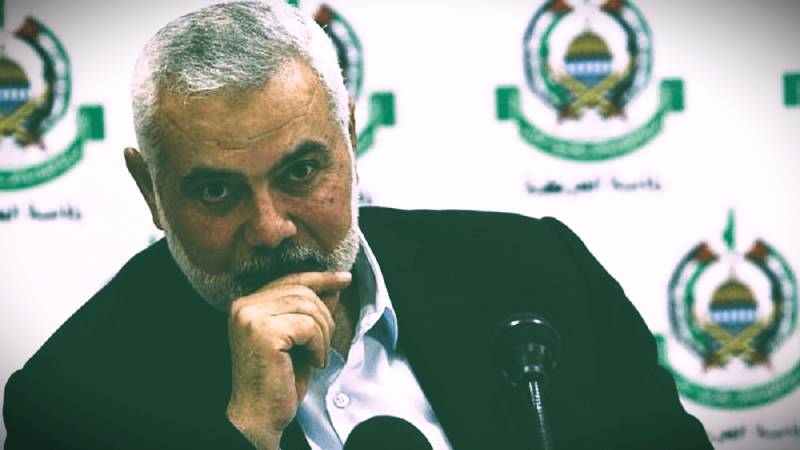
Israel has reportedly assassinated the political head of the Palestinian group Hamas, Ismail Haniyeh, in Iran.
Iranian authorities informed early on Wednesday morning that Haniyeh and his guard were found dead at their place of residence in Tehran. Haniyeh and senior officials from various countries, were in the Iranian capital for the swearing-in ceremony of Iran's new president, Masoud Pezeshkian,, who was elected earlier in July following a run-off election. Pakistan's Foreign Minister and Deputy Prime Minister Ishaq Dar is also in Iran for the same purpose.
"Brother leader, mujahid Ismail Haniyeh, the head of the movement, died in a Zionist strike on his residence in Tehran after he participated in the inauguration of the new (Iranian) president," Hamas said in a statement.
Hamas has vowed to retaliate to the assassination.
The strike has upped the ante in the ongoing conflict in the region, which has escalated since the October 7, 2023, strike by Hamas into Israel. Since that strike, Israel has all but flattened most of Gaza while also striking in the West Bank. It has also been engaged in a fierce battle with Hezbollah in the northwest. Israel has also been embroiled in the northeast over the Golan Heights. However, the conflict escalated further earlier this year when Israel first struck the Iranian embassy in Damascus. Iran retaliated by launching a massive drone barrage from its territory in the first-ever direct attack on Israel. Israel retaliated shortly thereafter.
Pezeshkian on Wednesday vowed to make Israel 'regret' the assassination as Iranian Supreme Leader Ayatollah Ali Khamenei vowed 'harsh punishment' for those responsible.
"We consider it our duty to seek revenge for his blood as he was martyred in the territory of the Islamic Republic of Iran," Khamenei said, hinting at a greater role for Iran in this conflict.
Widening conflict
Apart from targetting Haniyeh in Tehran, Israel also targeted a Hezbollah commander in south Beirut late on Tuesday and claimed to have killed him in the strike. The strike was in response to an alleged Hezbollah rocket strike on a playground in the Israel-annexed sections of the Golan Heights that left many people, including children of the Syrian Druze community, dead.
But Haniyeh's assassination has not only spelt the death knell for the ongoing peace process between Hamas and Israel but since Haniyeh was leading the negotiations from the Hamas side, it has given rise to fears of a region-wide conflict.
Syria said the strike would set the region 'ablaze'.
Russia said it was a "completely unacceptable political assassination" that would "lead to a further escalation of tensions."
Turkish President Recep Tayyip Erdogan condemned the "perfidious assassination" of the Hamas leader.
Who was Haniyeh?
Ismail Haniyeh had joined Hamas when it was founded in 1987 when the first Palestinian Intifada erupted against Israeli occupation.
Over the years, he climbed to various levels of prominence within the organisation and amid Palestinian leaders on both sides of the divide, having been elected as the Palestinian Prime Minister in 2006 after Hamas secured an upset victory.
He was ultimately elected as the head of the Hamas political bureau in 2017 to succeed Khaled Meshaal.
Considered a pragmatist, Haniyeh maintained good relations with the heads of the various Palestinian factions, including rivals to Hamas, such as the PLO.
Haniyeh, however, was forced to live in exile and split his time between Turkey and Qatar.
Prior to his assassination, Israel had frequently targeted him or his family, killing all of his sons and grandsons apart from at least nine members of his extended family.
During the war, he had traveled on diplomatic missions to Iran and Turkey, meeting the Turkish and Iranian presidents. He was among the Hamas leaders against whom an application was made in the International Court of Justice to issue arrest warrants over his role in the October 7, 2023 attacks.
Hampering peace
Haniyeh was believed to have been leading the negotiations between Hamas and Israel over the return of hostages and a lasting ceasefire in Gaza prior to his assassination.
Qatar, Egypt and the US were also involved in the negotiations but talks repeatedly came unstuck over various issues. This had dragged the conflict over Gaza for nearly 10 months.
Hence Haniyeh's assassination would impact the peace process.
Apart from leading the negotiations, Haniyeh was also making progress in brokering peace between various Palestinian factions, having overseen an agreement with rival Fatah to work for 'national unity' in Beijing just last week. Per the agreement, the two groups would work to jointly govern Gaza after the end of the ongoing conflict.
Chinese Foreign Minister Wang Yi, who hosted senior Hamas official Musa Abu Marzuk, Fatah envoy Mahmud al-Aloul and emissaries from 12 other Palestinian groups, said they had agreed to set up an "interim national reconciliation government" to govern post-war Gaza.

